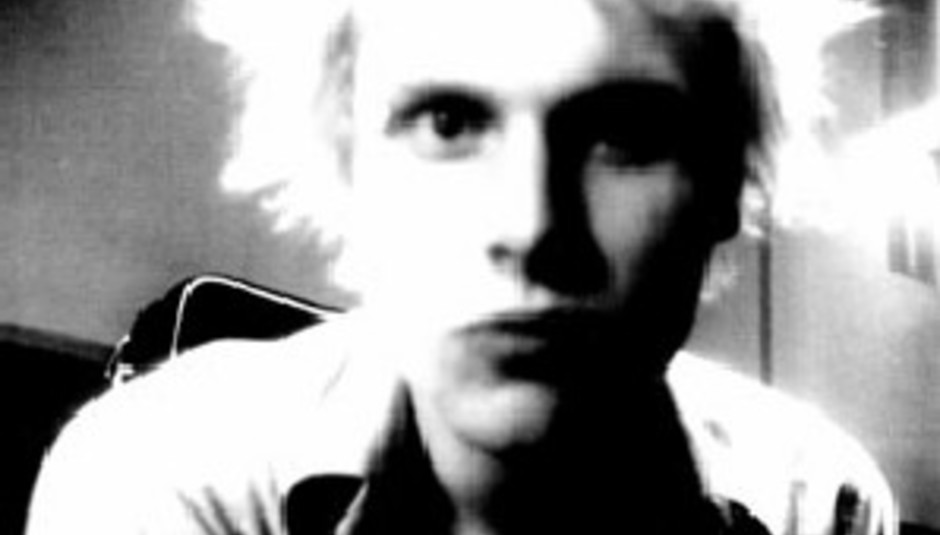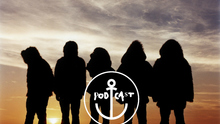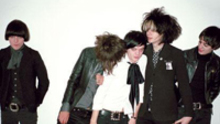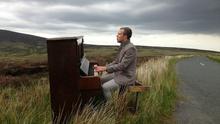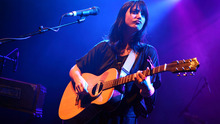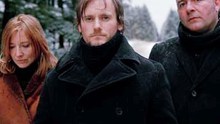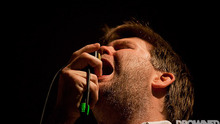For Feerick, the fact he’s onstage at all is something of an achievement, as a throat infection has already meant his band have had to cancel the first three dates of their biggest tour so far with Yourcodenameis:milo (who, by some quirk of fate, have had to pull out of tonight’s show at Nottingham’s Rock City and subsequently reschedule the rest of the tour due to a respiratory illness affecting singer Paul Mullen).
Formed approximately two years ago in Nottingham by the then 16-year-old Feerick, Amusement Parks On Fire have established themselves both locally, and amongst the usually harder-to-please provincial areas of Southern England. As well as Feerick on guitar and vocals, the band also consists of Daniel Knowles (guitar), Jez Cox (bass), and Peter Dale (drums), who between them in the past and present can boast membership of various bands such as The Grips, Punish The Atom and the Wolves (Of Greece).
Having signed to Invada Records earlier this year, the label owned by Portishead’s Geoff Barrow, Amusement Parks On Fire released their self-titled debut album in June to an almost unprecedented wave of acclaim from anyone who heard it. And yet, Mike still doesn’t seem totally happy with the media’s perception of his band…
“All this shoegazing stuff…People saying we’re the new My Bloody Valentine and all that…I mean, the NME called us “new-gazers” for God’s sake. I swear on my life that I had never heard anything by My Bloody Valentine until Dan (Knowles) played me an album of theirs on our first day in the studio.”
But surely for a new band starting out there can’t be many bigger compliments than being compared to someone like Kevin Shields?
Mike Feerick:“Well yeah, I mean hearing that record didn’t change what I was going to do on our album so I suppose in that way it is a compliment but, I just describe it as lazy journalism".
Dan Knowles:“The thing is though, its like if we’re asked by somebody to describe the music, we’d might as well just say Shoegazing and have done with it!”
Jez Cox: “Shoegazing doesn’t describe what our music is like though, it just describes what a bunch of lame Kevin Shields wannabes in the early 90s were like…”
Peter Dale: “In defence though, some people’s music can be difficult to describe and so I suppose its safer to take the easy option and just say it sounds like the nearest thing you can think of…”
Mike Feerick: “If they said we ripped off Dinosaur Jr or Swervedriver…”
But no one’s accusing you of ripping anyone off. Everyone has influences and one of the closest reference points to your sound is My Bloody Valentine.
Jez: “The thing is though, having heard those (shoegazing era) bands since, I don’t particularly like any of them anyway.”
Mike : “And I was only about five when their (My Bloody Valentine) last record ‘Loveless’ came out…I mean, the review of the album on Drowned In Sound was comparing us to the Valentines in the nicest possible way, but the shoegazing tag that some of the others have labelled us with???”
But that’s why people are drawn into the album. I mean it is a million miles away from Keane or Maroon 5 or Libertines-ville and that’s what makes it sound so out of time, and yet ultimately timeless because of that. Judging by the sounds on ‘Amusement Parks On Fire’, it is difficult to pinpoint any major influences you may have had from music that was made in the last ten years.
Jez: “Everything in music is cyclical anyway. What might not be seen as being fashionable now may be classed as being ‘in’, six months from now.”
Mike: “I wasn’t trying to be pretentious or show off an eclectic record collection or anything like that. I just wanted to get the album out as soon as possible. The thing is, it was influenced partly by Sigur Ros on one hand and then Black Flag on the other.”
Dan: “I think the raw energy of the record is pretty much in line with a lot of more recent bands, and particularly with a lot of the bands associated with the Nottingham scene over the past couple of years. I can see where people are getting the My Bloody Valentine angle from but I think there’s more of a kick, more of an edge to our music than just delay and feedback drenched soundscapes…”
Mike: “One of the bands I really loved when I was younger were the Smashing Pumpkins, and they were obviously influenced by My Bloody Valentine, and I think if people said we sounded more like the Pumpkins I’d find that slightly more complimentary…”
But isn’t that too much like getting caught up in the “Chicken and Egg” type syndrome?
Mike: “Not for me because I heard the Pumpkins first. It was only later on after I’d already written and started recording most of the album that I discovered My Bloody Valentine. It’s not that I’m offended by the comparisons – I mean Kevin Shields is an absolute genius – it’s just the convenient way that certain publications lump things together that makes me angry.”
On the whole though, it would be fair to say that to date you’ve had a very positive reception from the music press in general.
Mike: “Yeah, most of it’s been good, although today the new single (‘Venosa’) got a kicking in the NME. What I don’t quite get is that they gave the album 8/10 and called it “teenage genius” (as well as “new-gazing”) and yet the most commercial, pop song off the album is called “indie lame-duckery of limited ambition”. Honestly, it baffles me.”
Peter: “I think it does every band good to get slated from time to time, because if you’re riding along on the crest of a wave of good reviews it’s easy for complacency to kick in.”
Jez: “There’s been so many bands over the past few years who’ve got glowing reviews from day one and thought they’ve conquered the world, only to get one bad review along the way and just…implode!”
Peter: “To me, a bad review gives you a chance to re-assess what you’re doing.”
,b>Mike: “That song has its place on the album and should only really be judged in that context.”
You’ve all spent time with other Nottingham bands - Jez and Dan with the Grips and Peter with Punish The Atom. How did you all end up working together on the album?
Mike: “Many years ago I was in a band who supported a band that Dan and Jez were in…”
Dan: “And then moving on a few years later, I was working with a Nottingham based producer called Mark Spivey, and my role was to introduce people to the music industry via National Lottery funding, such as new musicians, A&R men, lawyers and the like, and Mike came along one day…”
Mike: “…so that went towards funding the first record, and then Dan and Jez joined the Grips and I ended up playing drums with them for a while. The Nottingham music scene is all a bit incestuous!”
Jez: “And you tend to find that most of the people within the Nottingham music scene tend to all live together…”
Mike: “…yeah, me, Dan and Jez ended up sharing the same room at one point, and so you end up practising together and then you’ll play with someone else who lives in the house and then you’ll end up writing something with somebody else and so on…”
Dan: “I heard the solo recordings that Mike had done and I got involved when it came to recording the album.”
Mike: “I did some demos with Mark Spivey and Dan was around at the time, and he had some really good ideas for laying down guitar sounds, and then Pete is just a drumming whore really, and Jez was just…there…so…”
Would you consider Mike as being the “main player” as it were, in the band, or do you all have an equal say in what happens with the songs?
Mike: “The album was already in place before the band really started, so the idea was to start expanding those songs using a band, and then as we played together more, each member brought their own interpretations to the mix ands we started experimenting with other sounds and instruments, using cellos on some tracks. The newer songs that we’ve written since the album are like a whole step forward from that first batch.”
Dan: “It is still Mike that brings all the songs down.”
Mike: “That’s where the rest of the band come in, really. I mean, there was no conceived idea in my head that the album was going to have one continuous sound or anything. The whole band brought that together and I think it made it easier for us as a whole that the first album had already been written, because I don’t think the band would have come together in the same way otherwise.”
How did you first get involve with Portishead’s Geoff Barrow and his label, Invada?
Mike: “Gary, our lawyer, is quite well known in the music industry, and got us a deal with Empress PR, and it just so happened our press agent was married to Geoff Barrow. Geoff had just started a label and Gary sent him a copy of the album and he liked it, which caught us all by surprise because Geoff, by his own admission, doesn’t like much rock music. He’s a strange character because the first time I met him he was talking about the stresses of trying to write a third album and I thought, “Oh my God! What am I doing?””
Dan: “I think that meeting brought it home to us that even a guy of his ability sometimes has problems in the studio, so we shouldn’t get too stressed at this moment in time.”
This tour seems to have been cursed from the start. Mike Feerick takes up the story:-
“Yeah, when we played at the ICA in London last night I thought “Wow!, we’re actually playing with a band who we have something in common with!” and then at quarter to eight tonight their tour manager told us that the singer was ill and they’d been forced to cancel the rest of the tour. Apart from that though, I enjoyed tonight’s show. I thought the first band, Agent Blue, were amazing. I felt sorry for them because it was obvious they were giving their all and yet it seemed like they were playing to a roomful of zombies.”
Apart from yourcodenameis:milo, you’ve supported a number of bands this year like Bloc Party and Six By Seven. Which have been the most memorable for you so far?
Mike: “Well, apart from yourcodenameis:milo, who we unfortunately only got to do the one gig with, Six By Seven have been the best for obvious reasons in that they’re on a similar plain to us musically and with all of us coming from Nottingham, they’re a band who we’ve always looked up to. The other band who I really enjoyed playing with, even though we have nothing in common musically, would be 50 Foot Wave. We did three dates with them and it was amazing.”
Jez: “It was just one of those unforgettable experiences. You’d have Kristin Hersh coming backstage with her little baby before you went on stage. Unbelievable, really.”
Mike: “We got a lot of good feedback from 50 Foot Wave and their fans on those dates as well. The first thing that most people associated us with were early Sonic Youth, which again, I can see the comparisons.”
The album is very similar in style to your live set, in that an instrumental piece will follow a three-minute headfuck of choral vocals and angry noise and distortion. Was that your intention?
Mike: “Its like if you come on stage and do a five minute ambient slab of noise followed by a three and a half minutes long pop song, people are gonna be thinking “What the fuck was that all about?”, whether they like it or not, so in that way it can end up being kind of exciting.”
Lyrically, the album’s best moments seem to revolve around often repeated couplets such as the “shouldn’t have to pay for it, ‘cos you never asked for it…” line in ‘Venosa’. What was the main inspiration behind the words on ‘Amusement Parks On Fire’?
Mike: “What are the lyrics about?..Uhmm…If I was in a pretentious mood I would say delusionment mixed with science fiction and paranoia on a global scale!”
Jez: “What we’re saying is that reality is ridiculous…”
Mike: “It’s like with ‘Venosa’, I was a lot younger when I wrote that, so I suppose you could say it was mostly inspired by youthful angst. It’s kind of about…”
Jez: “Is it about a girl?”
Mike: “Kind of, yeah. But not in a horrible way. It’s like where people’s perception of reality comes from years of listening to ballads where everything starts and ends the same and…I just find it ridiculous that people think they are gaining so much from something that frankly makes no sense. I mean, I do like pop songs, but I think the instrumental parts of the album give it a more emotive feel, and I don’t really consider myself a great lyricist.”
So where do you see yourself going with the next record?
Mike: “I think the main thing is to write an album that’s better than the last one, which, while being fairly reminiscent of the previous record in terms of sound, will also be more concise and direct. I mean, I’m two years older than when I finished writing the first record."

